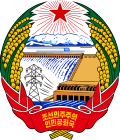History
The Socialist Federal Republic of Yugoslavia and the Democratic People's Republic of Korea had established diplomatic relations on October 30, 1948. Relations had been very close during the time of Josip Broz Tito and Kim Il Sung. Both leaders had taken a neutral stance during the Sino-Soviet split and maintained friendly relations with both the Soviet Union and China. [2] Both Serbia and North Korea are members of the Non-Aligned Movement. Yugoslavia, of which Serbia was a constituent part, was one of the movement's founding members. [2]
Under President Slobodan Milosević, Serbia had a very close relationship with North Korea. It was rumoured that North Korean students came to study in Belgrade. During the 1999 NATO bombing of Yugoslavia, the North Korean government strongly condemned NATO actions against Serbia. The North Korean foreign minister Paek Man Sun expressed his full support of the Serbian government against NATO, and urged the world community to prevent the United States from using military force in Kosovo. [3] [4] In 2000, a Workers' Party of Korea delegation participated in the fourth congress of the Socialist Party of Serbia, and representative Kim Man Ik delivered a speech condemning American imperialism in the Yugoslav Wars, and expressed his solidarity with the Serbian government and Slobodan Milošević. Regarding Serbia's military actions in Kosovo, Kim said, "The people and armed forces of Yugoslavia, determined to defend to the end the sovereignty of the country, turned out valiantly in a sacred war against the aggression of the US-led NATO forces and fully demonstrated to the rest of the world their indefatigable will and heroic stamina." [5]
In 2017, North Korean Ambassador Ri Pyong Du visited Belgrade and reaffirmed North Korea's support of Serbia's position on Kosovo. Serbian foreign minister Ivica Dačić stressed the need for a diplomatic solution to the North Korean crisis. [2] [6]
This page is based on this
Wikipedia article Text is available under the
CC BY-SA 4.0 license; additional terms may apply.
Images, videos and audio are available under their respective licenses.

